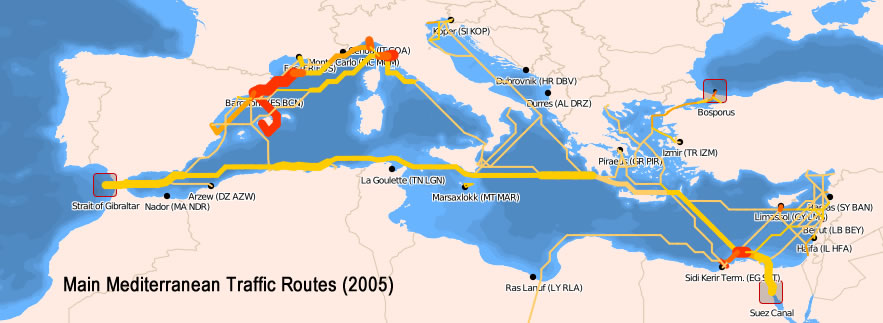SAFEMED III
 Map source: safemedproject.org
Map source: safemedproject.org
The SafeMed Project is a response to the interest of the European Union (EU) to develop Euro-Mediterranean co-operation in the field of maritime safety and security, prevention of pollution from ships and marine environmental issues by providing technical advice and support to the non-EU Mediterranean countries identified in the 1995 Barcelona Process.
The objective is to get a balanced approach in the application of maritime legislation in the region between the EU Member States and the Mediterranean partner countries through promoting a coherent, effective and uniform implementation of the relevant international conventions and rules aimed at better protecting the marine environment in the Mediterranean region by preventing pollution from ships.
With the intention to tackle the problem, a first SafeMed project (SafeMed I) ran from 2006 until 2008 and a second one (SafeMed II) from 2009 to 2012, both developed in co-operation with the Euro-Mediterranean Transport Forum (EUROMED).
SAFEMED III
In view of the achievements of the two previous SafeMed projects, the European Commission and the Mediterranean partner countries agreed to launch a third SafeMed project (SafeMed III), which runs from June 2013 to June 2016 for an overall duration of 36 months.
The Project is implemented by the European Maritime Safety Agency (EMSA) established by the Regulation EC 1406/2002.
The SafeMed III Project assists the Beneficiary countries (Algeria, Egypt, Israel, Jordan, Lebanon, Libya, Morocco, Palestinian Authority, Syria and Tunisia) with the further implementation of the 2007 adopted Regional Transport Action Plan (RTAP) for the Mediterranean 2007-2013 by building upon the achievements of SafeMed I and SafeMed II projects.
The overall objective of SafeMed III is:
To improve the protection of the Mediterranean sea marine environment against the risk of accidents at sea and marine pollution, by supporting the further ratification and implementation of international maritime safety and security conventions and improving the relevant capacities of maritime administrations in the Mediterranean partner countries. SafeMed III will focus on the approximation of the national legislation of the Beneficiary countries to the relevant EU legislation and, although being a regional project, the programme will focus also on specific needs at national level of each beneficiary country.
The specific objectives of the project are:
- To directly assist the competent maritime authorities of the Beneficiaries to align their national standards and practices with those of the European Union with the aim of promoting a harmonised approach in the field of maritime safety, security and pollution preparedness/response;
- To boost expertise and organisational capability of Beneficiaries to properly implement and enforce obligations that will arise from EU legislation;
- To provide officials from the Beneficiaries' maritime administrations with technical knowledge of the relevant international legislation in the field of maritime safety, security and pollution at sea preparedness/response;
- To identify and address shortcomings, gaps and grey areas which may hamper the fulfilment of the international obligations in relation to maritime safety, security and pollution preparedness/response with a view to get a balanced approach between the EU countries and the Beneficiaries in the application of maritime legislation in the Mediterranean sea;
- To exchange and disseminate best practices in the area of maritime safety, security and pollution prevention/response sharing and taking into account the experience of EU Member States and Beneficiaries maritime administrations;
- To encourage:
- the development of closer cooperation between
Beneficiaries at regional level in the field of maritime safety, security and
pollution preparedness/response; - possible common initiatives in the fields above;
- the development of closer cooperation between
- To enhance communication and information sharing between Beneficiaries, EMSA and EU Member States as well as among Beneficiaries themselves concerning:
- maritime safety, security and pollution prevention
- implementation of the relevant legislation
The Project foresees a multitude of activities designed to help achieve the objectives above, namely:
- trainings and workshops
- analysis/Studies and inventories
- operational support
- pilot projects
- targeted bilateral technical assistance to be defined with each beneficiary
Specific areas of assistance/cooperation are:
- Flag State Implementation
- Port State Control
- Vessel Traffic Monitoring and Information System (VTMIS)
- Protection of the marine environment
- Human element
- Security of ships and port facilities in the Mediterranean area
- Bilateral actions
